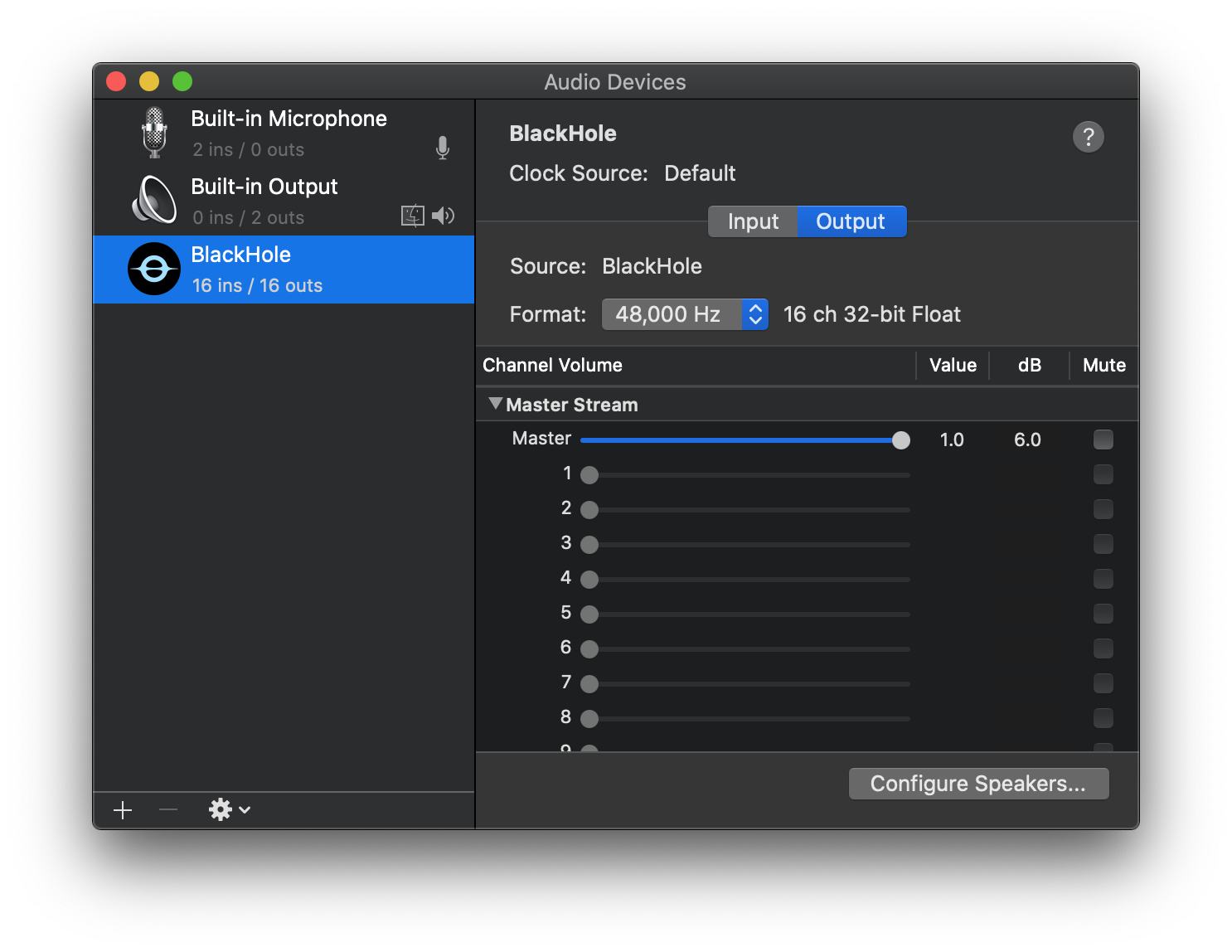BlackHole is a modern MacOS virtual audio driver that allows applications to pass audio to other applications with zero additional latency.
Sponsor: https://github.com/sponsors/ExistentialAudio
Current Funding: $137 per month.
- $50 per month. Create installer for BlackHole 2ch that will work along side BlackHole 16ch. (complete)
- $100 per month. One new detailed setup guide for each DAW.
- May: Logic Pro X
- June: GarageBand
- July: Audacity (in progress)
- August: Record System Audio with Quicktime (in progress)
- September: Record System Audio with Screen Capture. (in progress)
- $200 per month. One video tutorial per month.
- Features
- Easy Installation Instructions
- Usage Examples
- Advanced Installation Instructions
- Uninstallation Instructions
- Feature Requests
- FAQ
- Wiki
- Supports 16 audio channels.
- Customizable to 256+ channels if you think your computer can handle it.
- Supports 44.1kHz, 48kHz, 88.2kHz, 96kHz, 176.4kHz, and 192kHz sample rates.
- No additional driver latency.
- Works on macOS 10.10+ including macOS 10.15 Catalina
- Download Installer
- Close all running audio applications
- Open and install package
Install via Homebrew brew cask install blackhole
For more details visit https://github.com/ExistentialAudio/BlackHole/wiki/Installation
Visit the Wiki for application specific setup.
- Setup Multi-output Device
- In
Audio Midi Setup->Audio DevicesRight-click on the newly created Multi-output and select "Use This Device For Sound Output" - Open digital audio workstation (DAW) such as GarageBand and set input device to "BlackHole"
- Set track to input from channel 1-2
- Play audio from another application and monitor or record in your DAW.
- Set output driver to "BlackHole" in sending application
- Output audio to any channel
- Open receiving application and set input device to "BlackHole"
- Input audio from the corresponding output channels
- Build driver in Xcode
- Copy BlackHole.driver to
/Library/Audio/Plug-Ins/HAL - Restart CoreAudio with terminal command
sudo launchctl kickstart -kp system/com.apple.audio.coreaudiod
or manually uninstall
- Delete BlackHole.driver by running
rm -fr /Library/Audio/Plug-Ins/HAL/BlackHole.driverNOTE: The directory is in/Librarynotuser/Library - Restart CoreAudio with terminal command
sudo launchctl kickstart -kp system/com.apple.audio.coreaudiod
Need more help? Visit the wiki.
If you are interested in any of the following features please leave a comment in the linked issue. To request a features not listed please create a new issue.
- Sync Clock with other Audio Devices
- Output Blackhole to other Audio Device
- Add Support for AU Plug-ins
- Inter-channel routing
- Record Directly to File
- Configuration Options Menu
- Support for Additional Bit Depths
BlackHole is an audio interface driver. It only shows up in Audio MIDI Setup, Sound Preferences, or other audio applications.
Unfortunately macOS does not support changing the volume of a Multi-Output device but you can set the volume of individual devices in Audio MIDI Setup.
Audacity only works with macOS Catalina as of Audacity version 2.4.1 in May 2020. If you have an older version, you will need to upgrade to the latest release.
-
Check
System Preferences->Security & Privacy->Privacy->Microphoneto make sure your digital audio workstation (DAW) has microphone access. -
Check that the volume is all the way up on BlackHole input and output in
Audio Midi Setup. -
If you are using a multi-output device, due to issues with macOS the Build-in Output must be enabled and listed as the top device in the Multi-Output. https://github.com/ExistentialAudio/BlackHole/wiki/Multi-Output-Device#4-select-output-devices
Chances are you are looking in ~/Library/ or user/Library/ instead of /Library.
BlackHole is licensed under GPL-3.0. You can use BlackHole as long as your app is also licensed as GPL-3.0. For all other applications contact me directly at devinroth@existential.audio.





